14 Aug 2017 | Index in the Press, News and features
[vc_row][vc_column][vc_single_image image=”95179″ img_size=”full” alignment=”center”][vc_column_text]This column originally appeared in the Evening Standard.[/vc_column_text][vc_column_text]”Part of building an open, inclusive environment means fostering a culture in which those with alternative views…feel safe sharing their opinions.” Hear, hear. This is a view that so chimes with my beliefs as a free-speech campaigner that I could have written it myself. In fact, those are the words of Danielle Brown, Google’s vice-president of diversity, integrity and governance, in response to the furore over the so-called Google manifesto — the 10-page document in which Google software engineer James Damore outlined his views on why women don’t reach the top roles in certain jobs, arguing why the company’s diversity pushes were misplaced. Google so cherishes diversity it sacked a man for expressing an opinion it didn’t agree with… Spot a problem here?
In all the furore surrounding Damore’s memo, most of the focus has been on critiquing the views he expressed on the differences between men and women, but far less attention has been paid to the broader point he was trying to make: that unpopular views, views that did not accord with the mainstream ideology in the company, could not be expressed. And that this in turn could lead to a monotheistic culture that is not good for business.
“When it comes to diversity and inclusion, Google’s Left bias has created a politically correct monoculture that maintains its hold by shaming dissenters into silence,” Damore wrote. By sacking him, Google made Damore’s point for him.
Damore expressed a viewpoint that did not accord with the mainstream and he was sacked. I have read plenty of articles arguing he was dismissed not for expressing his opinion but because the expressing of that opinion made colleagues feel unsafe or uncomfortable (more on that later), or justifying the sacking because an employer has the right to discipline employees where their behaviour brings the company into disrepute. But actually, what those who defend Damore’s sacking are really doing is reinforcing something that is increasingly prevalent in our societies: a kind of liberal intolerance.
[/vc_column_text][vc_row_inner][vc_column_inner width=”1/4″][vc_icon icon_fontawesome=”fa fa-times-circle” color=”black” background_style=”rounded” size=”xl”][/vc_column_inner][vc_column_inner width=”3/4″][vc_column_text]
Ideas are not challenged by silencing them.
[/vc_column_text][/vc_column_inner][/vc_row_inner][vc_column_text]I heard it a lot in the wake of the killings at French satirical magazine Charlie Hebdo: “I believe in free speech, but…” and after that “but” came all kinds of things that the supposed defenders of free speech were in favour of censoring because they felt such censorship would better protect marginalised communities. The argument seemed to be that by banning certain kinds of speech we would somehow miraculously eradicate the dangerous, insidious and hateful viewpoints that underlie it.
This “it is OK to censor certain opinions” line is one most clearly articulated in universities — something Damore alluded to in his own manifesto. Views that are considered offensive are dubbed harmful, and speakers are drummed off campus — in some cases physically. In one incident earlier this year, Dr Charles Murray — a political scientist labelled a “white nationalist” for his book linking race and intelligence — was attacked by students after he tried to give a talk at Middlebury College in Vermont.
Ideas are not challenged by silencing them. Indeed, the video of Murray being shouted down by a group of students denying his right to speak demonstrates how an event that could have been an opportune moment to challenge ideas with which the students disagreed simply became an exercise in controlling the narrative. Imagine if the opposite had happened. Imagine if a Black Lives Matter activist had been shut down on campus by a ranting white supremacist mob. There would have been an international uproar.
And that’s the point. Free speech — genuine free speech that tolerates the ideas we find most offensive — must apply equally. It must apply to the ideas we hate as much as to the ideas we champion. What protects Damore’s right to opine that women are “more co-operative and agreeable than men” (Seriously? Has Damore met any actual women?) is also what protects my right to say his views are a laughable load of bollocks. What gives my views the right to be protected and his not?
Those in favour of constraining what others say often do so in the belief that it’s easy to identify, and agree on, good and bad speech. But consider the example of Iranian political activist and human-rights campaigner Maryam Namazie who, in 2015, was repeatedly heckled at an event on blasphemy at Goldsmiths college by members of the Islamic Society and accused of Islamophobia. In one of the great ironies created by the growing “safe space” movement, in which offensive ideas are dubbed so harmful they must be silenced, the Feminist Society at Goldsmiths said it stood in solidarity with the Islamic Society.
This equation of offensive speech with harm lies at the heart of the Google manifesto row, and much of the de facto censorship in operation in companies, online and on campus. Focusing on speech as harm is an easy fix. Don’t like what someone says? Ban them and, lo, we will be safer. (Turkey’s President, Recep Tayyip Erdogan, is a current good example of this in practice but the UK government’s repeated attempts to deal with “extremist” speech also risk going down this road). This is an easy fix because dealing with the problems underlying the words are so much harder: discrimination based on race, gender, sexuality, religion.
But homing in on speech is a false and dangerous fix. Banning ideas does not make those ideas go away — all too often the banning of an idea gives it more attention — and silencing those with whom we disagree is not the way to the more tolerant and diverse society Google envisages. Far better to let our opponents speak and then challenge them, openly, vocally. And work harder to address the structural problems that persistently marginalise certain groups and so give them a greater voice.[/vc_column_text][/vc_column][/vc_row][vc_row][vc_column][vc_basic_grid post_type=”post” max_items=”12″ style=”load-more” items_per_page=”4″ element_width=”6″ grid_id=”vc_gid:1502698304215-3aa8abeb-3e1e-8″ taxonomies=”6323″][/vc_column][/vc_row]
24 Jul 2017 | Mapping Media Freedom, Media Freedom, media freedom featured, News and features, Turkey, Turkey Uncensored
[vc_row][vc_column][vc_column_text]
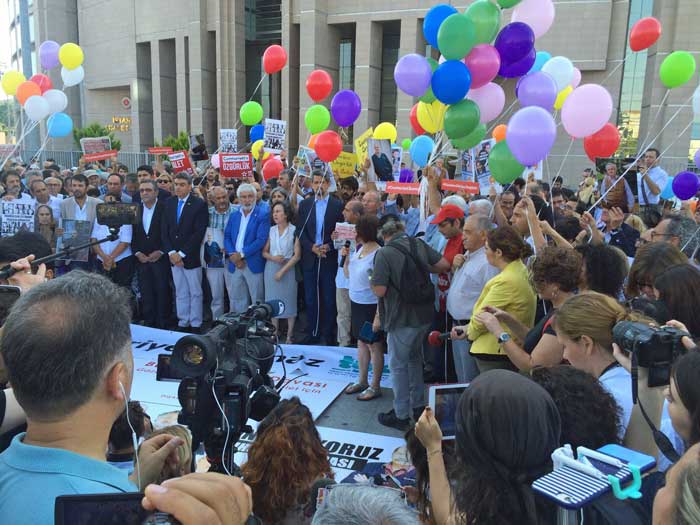
People gather in support of the Cumhuriyet defendants as the trial got underway.
Executives and columnists of Turkey’s critical Cumhuriyet daily go on trial this week, beginning Monday 24 July. The indictment seeks prison sentences for the defendants varying between 7.5 to 43 years. The charges for those on the board of the Cumhuriyet Foundation, which oversees the newspaper, include “abuse of power in office,” but all are accused of “supporting terrorist organisations” mainly through changes that have occurred in the paper’s editorial policy following the election of a new board to the foundation in 2013.
The prosecution’s claims are supported by views of several media experts — most of whom are former executives or employees terminated from various positions, according to Aydın Engin, a Cumhuriyet columnist who is also a defendant in the case although he was released pending trial due to his advanced age.
As Engin says “Cumhuriyet changed its editorial policy: this is the essence of the indictment.”
Indeed, the 435-page long document laments, page after page, that Cumhuriyet ditched its traditional, Kemalist, unyieldingly secularist and statist editorial policy and became a more open-minded newspaper.
The prosecutor states that by altering its editorial stance, the newspaper became a supporter of the so-called Fethullahist Terrorist Organization (FETÖ/PYD) — the name Turkish authorities give to the Fethullah Gülen network, which they say was behind last year’s coup attempt –, the Kurdistan Workers’ Party (PKK/KCK) and the Revolutionary People’s Liberation Party/Front (DHKP-C); three organizations with unrelated if not completely opposing worldviews.
“A newspaper changing its editorial policy cannot possibly be the subject of an indictment,” Engin says.
But did Cumhuriyet really change its editorial policy to legitimise the actions of FETÖ/PDY; PKK/KCK and DHKP/C as the prosecutor claims? “Every newspaper makes editorial policy changes as life unfolds. Cumhuriyet also did this. The paper caught up with the general tendencies in society such as increasing demand for freedoms, human rights and a stronger civil society.”
Engin says many of the witnesses who have testified against the Cumhuriyet journalists have been discredited as media professionals. “When I told the prosecutor that I will not respond to claims by people who have no reputation as journalists, he showed me a post by Professor Halil Berktay, who tweeted that ‘Cumhruiyet has become FETÖ’s media outlet.’ The prosecutor said, ‘This from a professor. Who are you to deny its validity?’
Engin: old and tired
Will any of the Cumhuriyet journalists be released at the end of this week? “I don’t even want to being to make any assumptions. This is not a legal trial; it is entirely political,” Engin replies, adding: “I strongly need them, personally, because I am 76 and tired,” says the energetic-looking journalist, who, as he speaks, is interrupted by someone asking him to sign a financial document. “See, I don’t even know what I just signed, I don’t know anything about these things.”
According to Engin, because those imprisoned are the key people to the newspaper’s operations, Cumhuriyet is now “half-paralyzed.”
But really, who are those in prison?
“Our brightest colleagues are in the can. Akın Atalay, is our CEO and I am a first-hand witness of how he has managed to keep the newspaper on its feet. Murat Sabuncu, he is perhaps one of the two or three finest journalists I know who can smell the news. He is publicly unheard of but Önder Çelik: he has been with Cumhuriyet for 35 years, he is the finest expert at things such as analyzing circulation reports, maintaining relations with printing houses; following paper prices..”
“I really need them to get out, but I don’t want to be dreaming.”[/vc_column_text][vc_row_inner][vc_column_inner][vc_separator color=”black”][/vc_column_inner][/vc_row_inner][vc_row_inner][vc_column_inner width=”1/2″][vc_custom_heading text=”Turkey” font_container=”tag:p|font_size:30|text_align:left” use_theme_fonts=”yes” link=”url:https%3A%2F%2Fmappingmediafreedom.org%2F|||”][vc_column_text]Index on Censorship monitors press freedom in Turkey and 41 other European area nations.
As of 24/07/2017, there were 496 verified reports of media freedom violations associated with Turkey in the Mapping Media Freedom database.[/vc_column_text][/vc_column_inner][vc_column_inner width=”1/2″][vc_single_image image=”94623″ img_size=”full” onclick=”custom_link” link=”https://mappingmediafreedom.org/#/”][/vc_column_inner][/vc_row_inner][vc_row_inner][vc_column_inner][vc_separator color=”black”][/vc_column_inner][/vc_row_inner][vc_row_inner][vc_column_inner][vc_column_text]The journalists on trial for the first time on 24 – 28 July:
 Akın Atalay (Cumhuriyet Foundation Executive President; imprisoned since Nov. 12, 2016): Facing 11 to 43 years in prison for “helping a terrorist organisation while not being a member” and “abusing trust”
Akın Atalay (Cumhuriyet Foundation Executive President; imprisoned since Nov. 12, 2016): Facing 11 to 43 years in prison for “helping a terrorist organisation while not being a member” and “abusing trust”
Atalay graduated from İstanbul University Law School in 1985. He has acted as the founding member of a number of civil society organisations and his academic studies on press freedom and the law have appeared in a large number of academic journals and newspapers. Since 1993, he has represented Cumhuriyet columnists and reporters as legal counsel. Currently, he is the newspaper’s executive president.
 Bülent Utku (Cumhuriyet Foundation Board Member, attorney representing Cumhuriyet; imprisoned since Nov. 5, 2016). Facing 9.5 to 29 years in prison for “helping a terrorist organisation while not being a member” and “abusing trust”
Bülent Utku (Cumhuriyet Foundation Board Member, attorney representing Cumhuriyet; imprisoned since Nov. 5, 2016). Facing 9.5 to 29 years in prison for “helping a terrorist organisation while not being a member” and “abusing trust”
Utku has worked as an attorney for 33 years. Since 1993, he has worked as a lawyer for Cumhuriyet columnists and journalists. He is also a member of the Cumhuriyet Foundation’s Board of Directors.
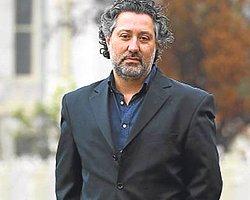 Murat Sabuncu (editor-in-chief, imprisoned since Nov. 5). Facing 7.5 to 15 years in prison for “helping a terrorist organisation while not being a member” [Turkish Penal Code (TCK) Article 314/2]
Murat Sabuncu (editor-in-chief, imprisoned since Nov. 5). Facing 7.5 to 15 years in prison for “helping a terrorist organisation while not being a member” [Turkish Penal Code (TCK) Article 314/2]
Sabuncu has been a journalist for 20 years. He started working at Cumhuriyet in 2014 as the newsroom coordinator. In July 2016, he took the helm as editor-in-chief.
 Kadri Gürsel (publications advisor, columnist, imprisoned since Nov. 5, 2015). Facing 7.5 to 15 years in prison for “helping a terrorist organisation while not being a member”
Kadri Gürsel (publications advisor, columnist, imprisoned since Nov. 5, 2015). Facing 7.5 to 15 years in prison for “helping a terrorist organisation while not being a member”
A journalist of 28 years, Gürsel started writing columns in Cumhuriyet in May 2016. He assumed the position of publications advisor for the newspaper in September 2016.
 Güray Öz (board member, news ombudsman, columnist, imprisoned since Nov. 5, 2015). Facing 8.5 to 22 years in prison for “helping a terrorist organisation while not being a member” and a single count of “abuse of power in office”
Güray Öz (board member, news ombudsman, columnist, imprisoned since Nov. 5, 2015). Facing 8.5 to 22 years in prison for “helping a terrorist organisation while not being a member” and a single count of “abuse of power in office”
Öz has been a journalist for 21 years. He has worked at Cumhuriyet since 2006. He is a columnist for the newspaper and has been its ombudsman since 2013. Öz is also on the board of directors of the Cumhuriyet Foundation.
 Önder Çelik (board member, imprisoned since Nov. 5, 2016). Facing 11.5 to 43 years in prison for “helping a terrorist organisation while not being a member” and four counts of “abuse of power in office”
Önder Çelik (board member, imprisoned since Nov. 5, 2016). Facing 11.5 to 43 years in prison for “helping a terrorist organisation while not being a member” and four counts of “abuse of power in office”
Önder Çelik has been a newspaper administrator for 35 years. He has worked as the print coordinator for the newspaper between 1981 – 1998. He returned to the same position in 2002 after a hiatus. He has been an executive board member since 2014 as well as a board member of the foundation.
 Turhan Günay (editor-in-chief of Cumhuriyet’s book supplement, imprisoned since Nov. 5, 2016). Facing 8.5 to 22 years for “helping a terrorist organisation while not being a member” and a single count of “abuse of power in office”
Turhan Günay (editor-in-chief of Cumhuriyet’s book supplement, imprisoned since Nov. 5, 2016). Facing 8.5 to 22 years for “helping a terrorist organisation while not being a member” and a single count of “abuse of power in office”
A journalist for 48 years, Günay has been with Cumhuriyet since 1987. For the past 25 years, he has worked as the chief editor for Cumhuriyet’s literary supplement, the country’s longest running weekly publication on books. The indictment insists he is a board member of the foundation; although he isn’t; a fact he reiterated in his testimony to the prosecutor.
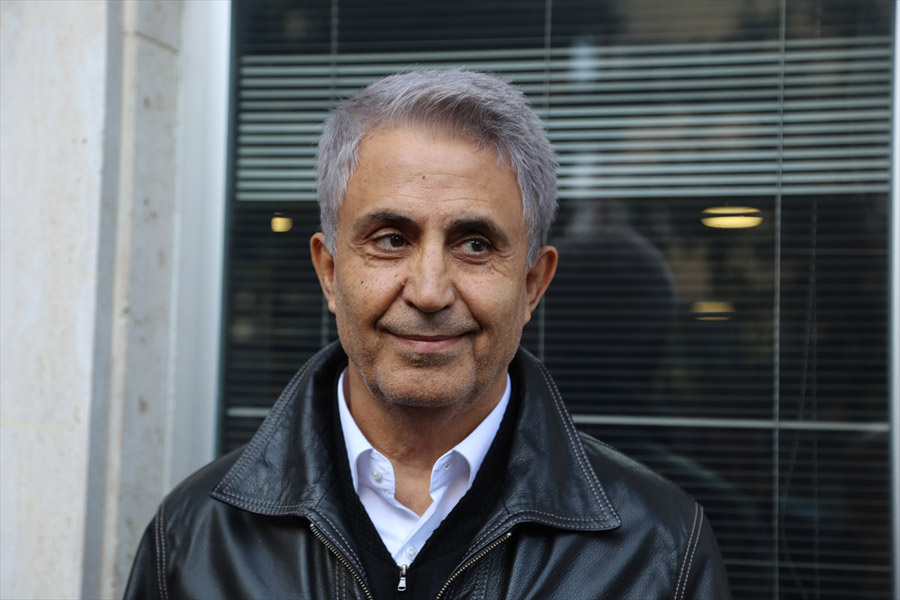
Musa Kart
Musa Kart (Cartoonist, board member, imprisoned since Nov. 5, 2016) Facing 9.5 to 29 years in prison for “helping a terrorist organisation while not being a member” and “abusing trust”
Musa Kart, one of Turkey’s most renowned cartoonists, has been drawing political cartoons for 33 years. He has been a Cumhuriyet journalist since 1985. For the past six years, Kart has drawn the front-page cartoons for Cumhuriyet.
 Hakan Karasinir (board member, imprisoned since Nov. 5). Facing 9.5 to 29 years in prison for “helping a terrorist organisation while not being a member” and two counts of “abuse of power in office”
Hakan Karasinir (board member, imprisoned since Nov. 5). Facing 9.5 to 29 years in prison for “helping a terrorist organisation while not being a member” and two counts of “abuse of power in office”
Hakan Karasinir has been a journalist for 34 years. He has been with Cumhuriyet for 34 years. In the past he has held various editorial positions, including serving as the newspaper’s managing editor between 1994 and 2014. Since 2014, he has also written columns in the newspaper.
 Mustafa Kemal Güngör (attorney, board member, imprisoned since Nov. 5, 2016). Facing 9.5 to 29 years in prison for “helping a terrorist organisation while not being a member”; two counts of “abuse of power in office”
Mustafa Kemal Güngör (attorney, board member, imprisoned since Nov. 5, 2016). Facing 9.5 to 29 years in prison for “helping a terrorist organisation while not being a member”; two counts of “abuse of power in office”
Mustafa Kemal Güngör has been a lawyer for 31 years. He has defended Cumhuriyet journalists and columnists in court since 2013.

Can Dundar
Can Dündar (former editor-in-chief of Cumhuriyet, currently resides abroad). Facing 7.5 to 15 years for “helping a terrorist organisation while not being a member”
Perhaps the most internationally famous of all Cumhuriyet defendants, Can Dündar was the editor-in-chief of Cumhuriyet until August 2016. He was arrested in November 2015 after Cumhuriyet published footage suggesting that the Turkish government sent weapons to armed jihadi groups in Syria. He was released in February 2016, a few months after which he moved to Germany where he currently resides.
 Orhan Erinç (Cumhuriyet Foundation Board President, columnist). Facing 11.5 to 43 years in prison for “helping a terrorist organization while not being a member” ; four counts of “abuse of power in office”
Orhan Erinç (Cumhuriyet Foundation Board President, columnist). Facing 11.5 to 43 years in prison for “helping a terrorist organization while not being a member” ; four counts of “abuse of power in office”
Veteran journalist Orhan Erinç, who worked for Cumhuriyet as a young reporter, returned to the newspaper in 1993 as its publications advisor. For nearly half a decade, Erinç also held the position of vice president at Turkish Journalists’ Association. He is also a columnist for Cumhuriyet.
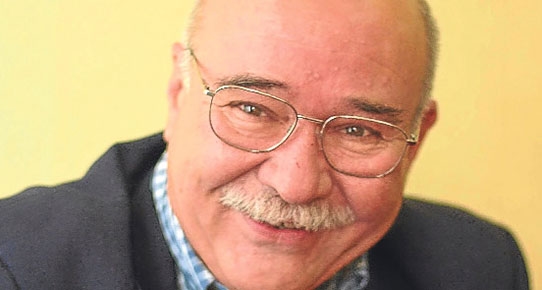 Aydın Engin (columnist, released under judicial control measures). Facing 7.5 to 15 years in prison for “helping a terrorist organization while not being a member”
Aydın Engin (columnist, released under judicial control measures). Facing 7.5 to 15 years in prison for “helping a terrorist organization while not being a member”
Cumhuriyet columnist Aydın Engin has been a journalist since 1969. He has participated in the founding process for many news outlets, including Turkey’s Birgün daily. He worked as a columnist and reporter for Cumhuriyet between 1992 and 2002. He returned to the newspaper in 2015.
 Hikmet Çetinkaya (columnist, board member, released under judicial control). Facing 9.5 to 29 years in prison for “helping a terrorist organisation while not being a member”; two counts of “abuse of power in office”
Hikmet Çetinkaya (columnist, board member, released under judicial control). Facing 9.5 to 29 years in prison for “helping a terrorist organisation while not being a member”; two counts of “abuse of power in office”
Çetinkaya has been with Cumhuriyet for three decades. In the past, the columnist worked as the İzmir Bureau Chief of the newspaper. He was also tried in 2015 along with Cumhuriyet columnist Ceyda Karan for reprinting the Charlie Hebdo cartoons in his column.
 Ahmet Şık (Correspondent, imprisoned since Dec. 30, 2016). Facing 7.5 to 15 years in prison for “helping a terrorist organisation while not being a member”
Ahmet Şık (Correspondent, imprisoned since Dec. 30, 2016). Facing 7.5 to 15 years in prison for “helping a terrorist organisation while not being a member”
No stranger to Turkish prisons, Ahmet Şık worked as a reporter for Cumhuriyret, Evrensel, Yeni Yüzyıl, Nokta and Reuters between 1991 and 2007. He remained in prison for a year in 2011 in an investigation about a shady gang called Ergenekon, believed to be nested within Turkey’s state hierarchy. He is known as one of the most vocal critics of the Fethullah Gülen network.
 İlhan Tanır (former Washington correspondent, resides abroad). Facing 7.5 to 15 years in prison for “helping a terrorist organisation while not being a member”
İlhan Tanır (former Washington correspondent, resides abroad). Facing 7.5 to 15 years in prison for “helping a terrorist organisation while not being a member”
İlhan Tanır previously reported from Washington for Cumhuriyet. His reports and analyses have appeared in many national and international publications. He currently resides in the United States.
 Bülent Yener (Finance Manager). Facing 7.5 to 15 years in prison for “helping a terrorist organization while not being a member”
Bülent Yener (Finance Manager). Facing 7.5 to 15 years in prison for “helping a terrorist organization while not being a member”
A former financial affairs manager with Cumhuriyet, Bülent Yener was released after one day in custody.
Günseli Özaltay (Accounting Manager). Facing 7.5 to 15 years in prison for “helping a terrorist organization while not being a member”
Günseli Özaltay, the newspaper’s accounting manager, was released after one day in custody.[/vc_column_text][/vc_column_inner][/vc_row_inner][vc_basic_grid post_type=”post” max_items=”12″ style=”load-more” items_per_page=”4″ element_width=”6″ grid_id=”vc_gid:1500894514864-6349d62e-4ed7-3″ taxonomies=”8607″][/vc_column][/vc_row]
12 May 2017 | Events
[vc_row][vc_column][vc_column_text]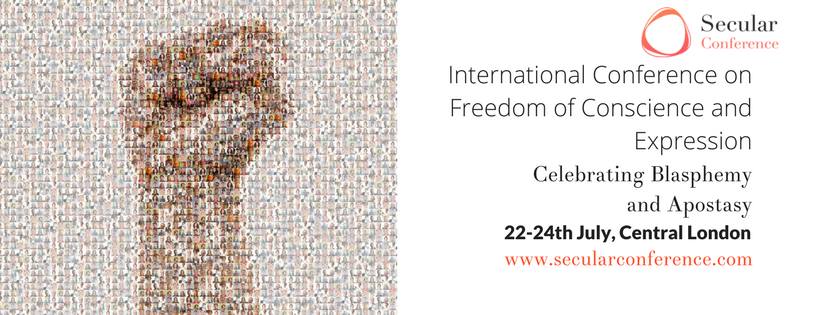
Join notable free-thinkers from around the world for a weekend of discussions and debates on freedom of conscience and expression in the 21st century at a spectacular venue in central London during 22-23 July 2017.
On 24 July, an activist strategy meeting will be followed by body-painting in support of ex-Muslims, which will be open to the public.
The two-day conference will discuss censorship and blasphemy laws, freedom of and from religion, apostasy, the limits of religion’s role in society, LGBT and women’s rights, atheism, secular values and more.
Speakers from countries or the Diaspora as diverse as Afghanistan, Algeria, Bangladesh, Canada, Egypt, France, India, Iran, Iraq, Iraqi Kurdistan, Ireland, Lebanon, Malaysia, Morocco, Nigeria, Norway, Pakistan, Palestinian Territories, Poland, Saudi Arabia, Sudan, Sweden, Switzerland, Syria, Turkey, Tunisia, UK, Ukraine, US and Yemen will gather in London to defend freedom of conscience and expression and argue that freedoms are not western but universal.
The conference will highlight the voices of people on the frontlines of resistance – many of them persecuted and exiled – as well as address challenges faced by activists and freethinkers, elaborate on the links between democratic politics and free expression and conscience, promote secular and rights-based alternatives, and establish priorities for collective action.
Art and culture will be integral to the event as will lively debate with the dauntless use of the free word.
Full schedule: http://www.secularconference.com/agenda-2017/
Confirmed Distinguished Speakers:
A C Grayling, Philosopher
Aliaa Magda Elmahdy, Egyptian Feminist Activist
Alya Al-Sultani, British-Iraqi Vocalist and Composer
Ani Zonneveld, Founder and President of Muslims for Progressive Values
Annie Laurie Gaylor and Dan Barker, Co-Presidents of the Freedom From Religion Foundation
Armin Navabi, Founder of Atheist Republic
Asher Fainman, President of Goldsmiths Atheist Society
Benjamin David, Editor-in-Chief of Conatus News
Bonya Ahmed, Activist, Writer and Blogger at Mukto-Mona
Cemal Knudsen Yucel, Co-Founder and Chair of Ex-Muslims of Norway
Chris Moos, Secular Activist
Damon Conlan and Neil Edwards, Magicians
Dave Silverman, President of American Atheists
Deeyah Khan, Filmmaker
Djemila Benhabib, Author and Activist
Elham Manea, Yemeni-born Author and Human Rights Campaigner
Fariborz Pooya, Bread and Roses TV Presenter and Editor
Fauzia Ilyas, Founder of Atheist & Agnostic Alliance Pakistan
Gina Khan, One Law for All Spokesperson
Gita Sahgal, Director of Centre for Secular Space
Gona Saed, Co-Founder of Kurdistan Secular Centre
Gurpreet Kaur Bhatti, Award-winning Playwright
Halima Begum, Ex-Muslim Feminist Researcher and Blogger
Hassan Radwan, Agnostic Muslim Khutbahs blog
Houzan Mahmoud, Culture Project Co-Founder
Imad Iddine Habib, Founder of Council of Ex-Muslims of Morocco
Inna Shevchenko, FEMEN Leader
Iram Ramzan, Journalist and Founder of Sedaa
Ismail Mohamed, Egyptian Atheist and Founder of Black Ducks Talk Show
Jane Donnelly and Michael Nugent, Atheist Ireland’s Human Rights Officer and Chairperson
Jodie Ginsberg, CEO of Index on Censorship
Karima Bennoune, UN Special Rapporteur in the Field of Cultural Rights
Karrar D. Al Asfoor, Co-founder of Atheist Alliance Middle East and North Africa
Kate Smurthwaite, Comedian
Kenan Malik, Author and Broadcaster
London Humanist Choir
Maajid Nawaz, Founding Chairman of Quilliam Foundation
Marieme Helie Lucas, Algerian Sociologist and Founder of Secularism is a Women’s Issue
Mario Ramadan, Co-Founder of Freethought Lebanon
Maryam Namazie, Iranian-born Rights Activist, Writer and Conference Organiser
Nadia El Fani, Tunisian Filmmaker
Nasreen Rehman, Co-Founder and Chair of British Muslims for Secular Democracy
Nina Sankari, Polish Atheist Activist
Noura Embabi, Muslim-ish President
Peter Tatchell, Human Rights Campaigner
Pragna Patel, Director of Southall Black Sisters
Rana Ahmad, Head of the RDF Arab Atheist Community
Rayhana Sultan, ExMuslimBecause
Richard Dawkins, Author and Scientist (subject to availability)
Sadia Hameed, Spokesperson of the Council of Ex-Muslims of Britain
Sanal Edamaruku, Founder and President of Rationalist International
Sarah Haider, Co-Founder of Ex-Muslims of North America
Sarah Peace, Nigerian Artist and Director of Fireproof Library
Savin Bapir Tardy, Counselling Psychologist for The Iranian and Kurdish Women’s Rights Organisation
Shabana Rehman, Performance Artist and Human and Animal Rights Advocate
Shelley Segal, Singer/Songwriter
Tasneem Khalil, Swedish-Bangladeshi Journalist and Editor of Independent World Report
Teresa Gimenez Barbat, MEP, Group of the Alliance of Liberals and Democrats for Europe and Euromind
Victoria Gugenheim, Award-winning Body Artist
Waleed Al Husseini, Palestinian Writer and Founder of Council of Ex-Muslims of France
Yasmine Mohammed, Confessions of an ExMuslim
Yasmin Rehman, Women’s Rights Campaigner
Zehra Pala, President of Atheism Association of Turkey
Zineb El Rhazoui, Moroccan-born Columnist for Charlie Hebdo
Speaker biographies available here: http://www.secularconference.com/speakers-2017/
For more information, contact Maryam Namazie, [email protected].uk.
The conference is sponsored by: Alliance of Liberals and Democrats for Europe; Atheist International Alliance; Bread and Roses TV; Center for Inquiry; Centre for Secular Space; Council of Ex-Muslims of Britain; Culture Project; Euromind; Equal Rights Now; Fitnah; Freedom from Religion Foundation; National Secular Society; One Law for All; Richard Dawkins Foundation for Reason and Science; Southall Black Sisters; and Secularism is a Women’s Issue.[/vc_column_text][/vc_column][/vc_row][vc_row][vc_column][vc_column_text]
When: 22-24 July
Where: Central London
Tickets: From £65 via Secular Conference No tickets will be sold at the door.
[/vc_column_text][/vc_column][/vc_row]
14 Mar 2017 | Digital Freedom, Mapping Media Freedom, News and features
[vc_row][vc_column][vc_column_text]
Each week, Index on Censorship’s Mapping Media Freedom project verifies threats, violations and limitations faced by the media throughout the European Union and neighbouring countries. Here are recent reports that give us cause for concern.
The Madrid Journalists Association (APM) received a petition from a group of journalists they had experienced a “systemised campaign of personal and network harassment” from the left-wing Podemos party.
According to a press release from APM, the reporters said they had been harassed and pressured by the Podemos, led by Pablo Iglesias, for over a year. The press release also said that the harassment came in the form of threatening phone calls, emails, and messages or comments on social media such as Twitter. APM believes that the harassment is an attempt by Podemos officials to improve their reputation and image by eliminating any media criticism of the party.
Elvi Fundo, the news editor for the online publication Citynews.al and Radio Best, was attacked in Tirana on the morning of 8 March. The reporter was on his way to his office in the city when he was violently assaulted by two unknown assailants and suffered from injuries which landed him in the hospital.
Fundo, who is known for publishing investigations into corruption and conflict of interests, told the Balkan Insight that he does not believe the attacks had political connotations. Instead, Fundo said, he believes the attack was “the work of criminals financed by corrupt media clans tied to drug-trafficking.” Both journalists and politicians, including the Albanian Union of Journalists and Prime Minister Edi Rama, have condemned the attack as a threat to media and press freedom.
Journalists and politicians, including the Albanian Union of Journalists and Prime Minister Edi Rama, have condemned the attack as a threat to media and press freedom. Although the police have launched an investigation into the assault, the identity and motive of the assailants are still unknown.
Reporter Igor Zalyubovin and photographer Vladimir Yarotsky were arrested and detained by officers of the Russian Security Service (FSB) in Svetogorsk on 7 March. The journalists, who work for Snob, a Moscow-based independent news magazine, were taken to a detention centre and charged with crossing into a border zone without permission.
Zalyubovin and Yarotsky had rented an apartment in Svetogorsk, a town of about 15,000 outside the border of Finald, to use while reporting on Mayor Sergey Davydov’s claim that it is a “city without sin” because there are no homosexual residents. A 2014 law requires journalists to have specific permission from the FSB to work in the border zone, however, according to Snob’s editor-in-chief, they did not apply for a permit due to time constraints.
The Committee to Protect Journalists denounced the incident and said that this is the second time that journalists were detained and forced to leave Svetogorsk for border zone violations while doing follow-up reporting on the Mayor’s comments. [/vc_column_text][/vc_column][/vc_row][vc_row equal_height=”yes” content_placement=”middle” css=”.vc_custom_1489421829923{background-color: #d5473c !important;background-position: center !important;background-repeat: no-repeat !important;background-size: cover !important;}” el_class=”text_white”][vc_column width=”1/2″][vc_column_text]
[/vc_column_text][/vc_column][vc_column width=”1/2″ css=”.vc_custom_1489422066539{background-image: url(https://www.indexoncensorship.org/wp-content/uploads/2017/01/MMF_report_2016_WEB-1-1A.jpg?id=85872) !important;background-position: center !important;background-repeat: no-repeat !important;background-size: cover !important;}”][/vc_column][/vc_row][vc_row][vc_column][vc_column_text]
Nu Ener, a news editor for the Yeni Asya daily, said was arrested by police on charges of association and membership to the FETO/PDY terrorist organisation.
According to a report published in Yeni Asya, Ener was originally detained following a police raid on her home on 3 March. Three days later, the 4th Criminal Judicature of Peace found that she was guilty of membership to the terrorist organisation which has ties to Fethullah Gulen, the Muslim preacher whom the Turkish government blames for the failed coup this past July. Ener was specifically accused of using Bylock, a mobile communications application, to help organise the coup attempt.
Ener, who remains incarcerated in the Bakirkoy Prison for women, is one out of 155 journalists currently imprisoned in Turkey.
The circulation of Pras Press, a new satirical newspaper by Bulgaria’s “Society of Rude Cartoonists,” was blocked by the State Distribution Company on 5 March. The newspaper, which is known as the Bulgarian version of ‘Charlie Hebdo,’ first went on sale on 1 March, but since distribution ceased, only one tenth of the printed copies has been sold.
Journalist Ivan Bakalov said that he believes MP Delyan Peevski is behind the incident although he is not one of the listed owners of the State Distribution Company. Bakalov and his colleagues believe that the mocking of political elites in Pras Press likely contributed to the circulation block.
Despite Bulgaria’s low ranking of 113 in the 2016 Press Freedom Ranking of Reporters without Borders, the journalists of Pras Press have pledged to bring their case to the Commission for Protection of Competition, the state prosecution, caretaker government, and President Rumen Radev in hopes to resume circulation.[/vc_column_text][/vc_column][/vc_row][vc_row][vc_column][vc_column_text]
Click on the bubbles to view reports or double-click to zoom in on specific regions. The full site can be accessed at https://mappingmediafreedom.org/
[/vc_column_text][/vc_column][/vc_row][vc_row][vc_column][vc_basic_grid post_type=”post” max_items=”4″ element_width=”6″ grid_id=”vc_gid:1489422274293-9bbe61ad-21b3-2″ taxonomies=”6564″][/vc_column][/vc_row]


 Akın Atalay (Cumhuriyet Foundation Executive President; imprisoned since Nov. 12, 2016): Facing 11 to 43 years in prison for “helping a terrorist organisation while not being a member” and “abusing trust”
Akın Atalay (Cumhuriyet Foundation Executive President; imprisoned since Nov. 12, 2016): Facing 11 to 43 years in prison for “helping a terrorist organisation while not being a member” and “abusing trust” Bülent Utku (Cumhuriyet Foundation Board Member, attorney representing Cumhuriyet; imprisoned since Nov. 5, 2016). Facing 9.5 to 29 years in prison for “helping a terrorist organisation while not being a member” and “abusing trust”
Bülent Utku (Cumhuriyet Foundation Board Member, attorney representing Cumhuriyet; imprisoned since Nov. 5, 2016). Facing 9.5 to 29 years in prison for “helping a terrorist organisation while not being a member” and “abusing trust” Murat Sabuncu (editor-in-chief, imprisoned since Nov. 5). Facing 7.5 to 15 years in prison for “helping a terrorist organisation while not being a member” [Turkish Penal Code (TCK) Article 314/2]
Murat Sabuncu (editor-in-chief, imprisoned since Nov. 5). Facing 7.5 to 15 years in prison for “helping a terrorist organisation while not being a member” [Turkish Penal Code (TCK) Article 314/2] Kadri Gürsel (publications advisor, columnist, imprisoned since Nov. 5, 2015). Facing 7.5 to 15 years in prison for “helping a terrorist organisation while not being a member”
Kadri Gürsel (publications advisor, columnist, imprisoned since Nov. 5, 2015). Facing 7.5 to 15 years in prison for “helping a terrorist organisation while not being a member”  Güray Öz (board member, news ombudsman, columnist, imprisoned since Nov. 5, 2015). Facing 8.5 to 22 years in prison for “helping a terrorist organisation while not being a member” and a single count of “abuse of power in office”
Güray Öz (board member, news ombudsman, columnist, imprisoned since Nov. 5, 2015). Facing 8.5 to 22 years in prison for “helping a terrorist organisation while not being a member” and a single count of “abuse of power in office”  Önder Çelik (board member, imprisoned since Nov. 5, 2016). Facing 11.5 to 43 years in prison for “helping a terrorist organisation while not being a member” and four counts of “abuse of power in office”
Önder Çelik (board member, imprisoned since Nov. 5, 2016). Facing 11.5 to 43 years in prison for “helping a terrorist organisation while not being a member” and four counts of “abuse of power in office”  Turhan Günay (editor-in-chief of Cumhuriyet’s book supplement, imprisoned since Nov. 5, 2016). Facing 8.5 to 22 years for “helping a terrorist organisation while not being a member” and a single count of “abuse of power in office”
Turhan Günay (editor-in-chief of Cumhuriyet’s book supplement, imprisoned since Nov. 5, 2016). Facing 8.5 to 22 years for “helping a terrorist organisation while not being a member” and a single count of “abuse of power in office” 
 Hakan Karasinir (board member, imprisoned since Nov. 5). Facing 9.5 to 29 years in prison for “helping a terrorist organisation while not being a member” and two counts of “abuse of power in office”
Hakan Karasinir (board member, imprisoned since Nov. 5). Facing 9.5 to 29 years in prison for “helping a terrorist organisation while not being a member” and two counts of “abuse of power in office” 
 Orhan Erinç (Cumhuriyet Foundation Board President, columnist). Facing 11.5 to 43 years in prison for “helping a terrorist organization while not being a member” ; four counts of “abuse of power in office”
Orhan Erinç (Cumhuriyet Foundation Board President, columnist). Facing 11.5 to 43 years in prison for “helping a terrorist organization while not being a member” ; four counts of “abuse of power in office”  Aydın Engin (columnist, released under judicial control measures). Facing 7.5 to 15 years in prison for “helping a terrorist organization while not being a member”
Aydın Engin (columnist, released under judicial control measures). Facing 7.5 to 15 years in prison for “helping a terrorist organization while not being a member”  Hikmet Çetinkaya (columnist, board member, released under judicial control). Facing 9.5 to 29 years in prison for “helping a terrorist organisation while not being a member”; two counts of “abuse of power in office”
Hikmet Çetinkaya (columnist, board member, released under judicial control). Facing 9.5 to 29 years in prison for “helping a terrorist organisation while not being a member”; two counts of “abuse of power in office”  Ahmet Şık (Correspondent, imprisoned since Dec. 30, 2016). Facing 7.5 to 15 years in prison for “helping a terrorist organisation while not being a member”
Ahmet Şık (Correspondent, imprisoned since Dec. 30, 2016). Facing 7.5 to 15 years in prison for “helping a terrorist organisation while not being a member”  İlhan Tanır (former Washington correspondent, resides abroad). Facing 7.5 to 15 years in prison for “helping a terrorist organisation while not being a member”
İlhan Tanır (former Washington correspondent, resides abroad). Facing 7.5 to 15 years in prison for “helping a terrorist organisation while not being a member”  Bülent Yener (Finance Manager). Facing 7.5 to 15 years in prison for “helping a terrorist organization while not being a member”
Bülent Yener (Finance Manager). Facing 7.5 to 15 years in prison for “helping a terrorist organization while not being a member” 
